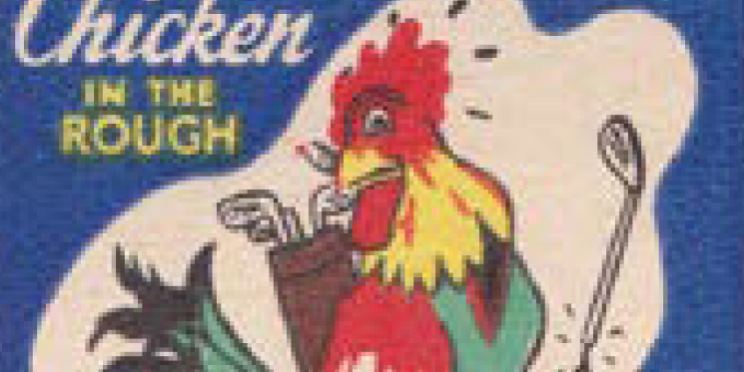In the period between World War I and II, cigarette smoking was commonplace, and the most popular advertising giveaway was the matchbook. The following samples illustrate some businesses that catered to tourists.
Cafes for travelers
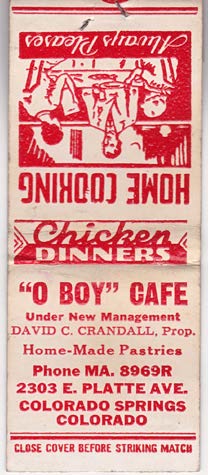
Family Café: David C. Crandall celebrated his takeover of the “O Boy” café in Colorado Springs with overprinting a generic matchbook scene of diners enjoying “Home Cooking.” He emphasized the café’s “Home-Made Pastries.”
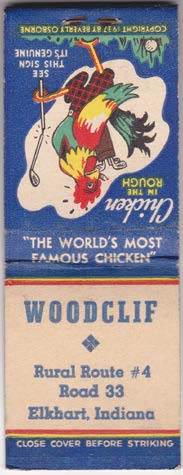
Chain Entree: Chicken in the Rough, a method of cooking chicken copyrighted in 1937, provided a patented feature matchbook, where the illustration of a rooster playing golf was repeated on the matches themselves. Woodclif, a local restaurant that offered this dish, overprinted their name and location on the matchbook.
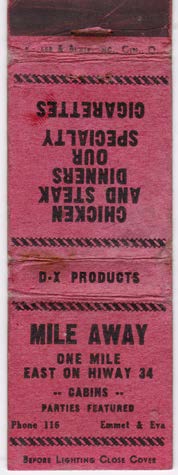
Motel Dining Room: The “Mile Away” cabins on “Hiway 34” east of Greeley, Colorado, promised to host parties featuring their specialties, chicken and steak dinners. The business also sold cigarettes and “D-X Products” (Sunoco brands). These matches were likely distributed during Prohibition, because of the casual “Emmet & Eva” signature, and the range of hospitality.
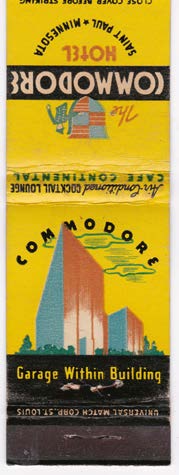
Hotel Dining Room: The Commodore in St. Paul, Minnesota, had both a Café Continental and a post-Prohibition Cocktail Lounge – its upscale Art Deco artistry made even more appealing with the added air conditioning. To attract the automobile tourist, it emphasized, “Garage Within Building.”
Accommodations for travelers
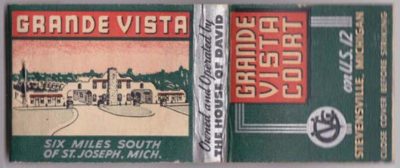
Motel: The Grande Vista Court of Stevensville, near St. Joseph, Michigan, on Highway 12, was one of the many businesses owned and operated by the communitarian religious group, The House of David. The motel was built in 1935 with an enormous petrified rock chimney studded with geodes but was demolished in 2000.
Vehicle services for travelers
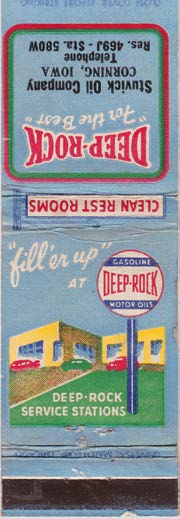
Local service station: “Deep-Rock” motor oils and gasoline were the 1940s and 1950s products of the Stuvick Oil Company in Corning, Iowa. The station boasted what all motorists looked for – “Clean Rest Rooms.”
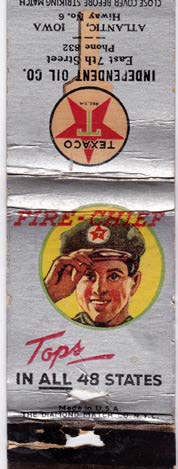
Chain service station: Texaco declared it was “Tops in All 48 States.” Franchises, such as the Independent Oil. Co. of Atlantic, Iowa, overprinted the brand’s “Fire Chief” advertising.
Destinations for travelers
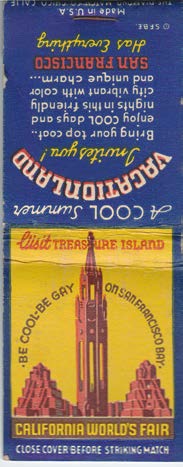
The California World’s Fair was advertised throughout the country as “a cool summer vacationland” in 1939. “Be Cool, Be Gay, On San Francisco Bay.”
Creating matchbook designs was big business, as seven different companies are represented in this article:
- Superior Match Co. in Chicago
- The Diamond Match Co. in Chico Calif.
- The Ohio Match Sales Co. in St. Louis
- Kaiser & Blair Co. in Cincinnati
- Lion Match Co. in New York
- Universal Match Co. in Chicago
- Federal Match Corp. in New York.
With an eye on safety, before the matchbook industry decided on “Close cover before striking,” they tried out: “Before lighting close cover,” “Close cover for safety,” “Close cover before striking match.”
Did you enjoy this article? Join the SCA and get full access to all the content on this site. This article originally appeared in the SCA Journal, Fall 2018, Vol. 36, No. 2. The SCA Journal is a semi-annual publication and a member benefit of the Society for Commercial Archeology.
More Articles Join the SCA


